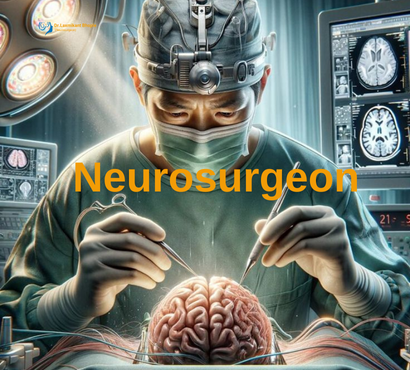What Does a Neurosurgeon Do? Myths vs. Facts
Neurosurgery is one of the most complex and intriguing medical specialties. However, it’s often surrounded by myths and misconceptions. Understanding the role of a neurosurgeon and distinguishing facts from myths can help patients make informed decisions about their neurological health.
This blog explores what neurosurgeons do, dispels common myths, and sheds light on the importance of neurosurgery for overall health.
What is Neurosurgery?
Neurosurgery involves the diagnosis, treatment, and prevention of disorders affecting the brain, spinal cord, and peripheral nervous system. Neurosurgeons are highly specialized physicians trained to perform intricate surgeries and non-surgical procedures to address conditions such as brain tumors, spinal disorders, and neurological trauma.
Myths vs. Facts about Neurosurgeons
Myth 1: Neurosurgeons Only Perform Brain Surgery
Fact: While neurosurgeons are widely associated with brain surgery, their expertise extends to various neurological conditions. They treat spinal disorders, nerve compressions, and even conditions like epilepsy and chronic pain. Neurosurgeons also work closely with other specialists to provide comprehensive care.
Myth 2: Neurosurgery Always Involves Open Surgery
Fact: Modern neurosurgery includes minimally invasive techniques like endoscopic and robotic-assisted surgeries. These methods reduce recovery time, minimize risks, and enhance precision.
Myth 3: Neurosurgery is Always Risky
Fact: All surgeries carry risks, but advancements in technology and medical expertise have significantly improved the safety and success rates of neurosurgical procedures. Proper preoperative assessments further minimize complications.
Myth 4: Only Severe Conditions Require a Neurosurgeon
Fact: Neurosurgeons also manage non-life-threatening conditions like herniated discs, carpal tunnel syndrome, and chronic back pain. Early consultation can prevent the progression of these issues.
Myth 5: Neurosurgery Results in Long Recovery Periods
Fact: Recovery depends on the procedure and the patient’s overall health. Minimally invasive techniques often allow for quicker recovery, enabling patients to return to normal activities sooner.
Key Responsibilities of a Neurosurgeon
- Diagnosis and Evaluation
Neurosurgeons assess symptoms, conduct imaging studies, and evaluate neurological function to determine the root cause of a problem. - Surgical and Non-Surgical Treatments
They decide on the best approach for treatment—whether surgery, medication, or physical therapy. - Emergency Care
Neurosurgeons handle critical situations such as traumatic brain injuries, stroke, or spinal cord injuries. - Post-Surgical Care and Rehabilitation
They guide patients through recovery and rehabilitation, ensuring optimal healing and functionality.
Common Conditions Treated by Neurosurgeons
1. Brain Tumors
- Removal of malignant or benign tumors to alleviate pressure and prevent neurological complications.
2. Spinal Disorders
- Treatment of herniated discs, spinal stenosis, and scoliosis to restore mobility and reduce pain.
3. Stroke and Aneurysms
- Neurosurgeons manage hemorrhages and repair aneurysms to prevent life-threatening conditions.
4. Nerve Disorders
- Addressing issues like trigeminal neuralgia and carpal tunnel syndrome to alleviate chronic pain and nerve damage.
5. Epilepsy Surgery
- For patients with drug-resistant epilepsy, neurosurgeons perform procedures to reduce seizures and improve quality of life.
Advancements in Neurosurgery
1. Minimally Invasive Techniques
These procedures involve smaller incisions, leading to faster recovery and reduced risk of infection.
2. Robotic-Assisted Surgery
Robotics provide greater precision in complex surgeries, enhancing outcomes.
3. Image-Guided Surgery
Advanced imaging technologies help neurosurgeons plan and execute surgeries with unmatched accuracy.
4. Neuro-Oncology Innovations
Targeted therapies and advanced surgical techniques have improved the management of brain and spinal tumors.
Why Neurosurgical Care is Essential
Neurosurgeons play a vital role in addressing conditions that significantly impact quality of life. From chronic pain to life-threatening diseases, their expertise ensures patients receive the best possible care.
Ignoring neurological symptoms can lead to complications. Consulting a neurosurgeon early can prevent worsening conditions and promote better outcomes.
FAQs
- When should I consult a neurosurgeon?
- Consult a neurosurgeon if you experience chronic headaches, persistent back pain, neurological deficits like weakness or numbness, or are diagnosed with conditions like a brain tumor or spinal disorder.
- Are all neurological conditions treated with surgery?
- No, many neurological conditions can be managed with medication, physical therapy, or minimally invasive procedures. Surgery is only recommended when necessary.
- How do I prepare for a neurosurgical procedure?
- Follow your surgeon’s instructions, which may include preoperative tests, dietary adjustments, and stopping certain medications. Clear communication with your doctor is key.

